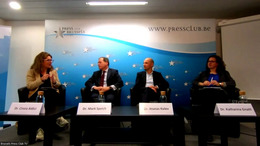Thomas Schwab began the event by presenting the key findings of the study. His points painted a somewhat gloomy picture of the future of cohesion between EU regions. The green transition poses significant challenges to many European regions that will struggle to adapt their economic production and infrastructure to EU decarbonisation goals.
Digitalisation may also present more opportunities to economically well-developed regions than to regions that specialise in low-tech manufacturing or agriculture. Urban areas stand out as having more potential for future economic growth on the back of the twin transition. Many regions that are already struggling with low economic growth in southern and eastern Europe have a worse outlook than regions in northern and western Europe. As a result, the divide between richer and poorer regions will likely widen.
Following the presentation, a panel discussed what this conclusion means for EU cohesion policy, featuring:
- Katharina Gnath, Senior Project Manager, Bertelsmann Stiftung
- Atanas Kolev, Principal Advisor, Economics Department, European Investment Bank
- Mark Speich, State Secretary for Federal, European and International Affairs and Media, North Rhine Westphalia, and member of the European Committee of the Regions
Moderating the discussion was Dr. Cinzia Alcidi, Director of Research at the Center for European Policy Studies.
Building on the study’s findings that EU cohesion faces new challenges, the panel focused on ideas for the future of cohesion policy. Mark Speich, when asked whether cohesion policy should have a more centralized approach, emphasized the need to engage regions more directly. He pointed out that regions are even more economically diverse than the study can illustrate and that input from regions is essential to shaping tailor-made regional policy.
Katharina Gnath observed that longer-term budget planning, like the seven-year multiannual financial framework, is perhaps too rigid when the EU faces multiple crises. When it comes to putting the instruments of the EU to work in the most effective, flexible way, Atanas Kolev stressed that many regions still lack the administrative capacities to best utilize EU funds for regional development.
The panelists agreed that policy synergy and coherency are important when challenges like the twin transition are met with multiple crises, from COVID to Russia’s invasion of Ukraine.
The discussion made clear that understanding the extent to which the twin transition will increase economic disparities between regions is just the beginning of reshaping cohesion policy for a new era.






